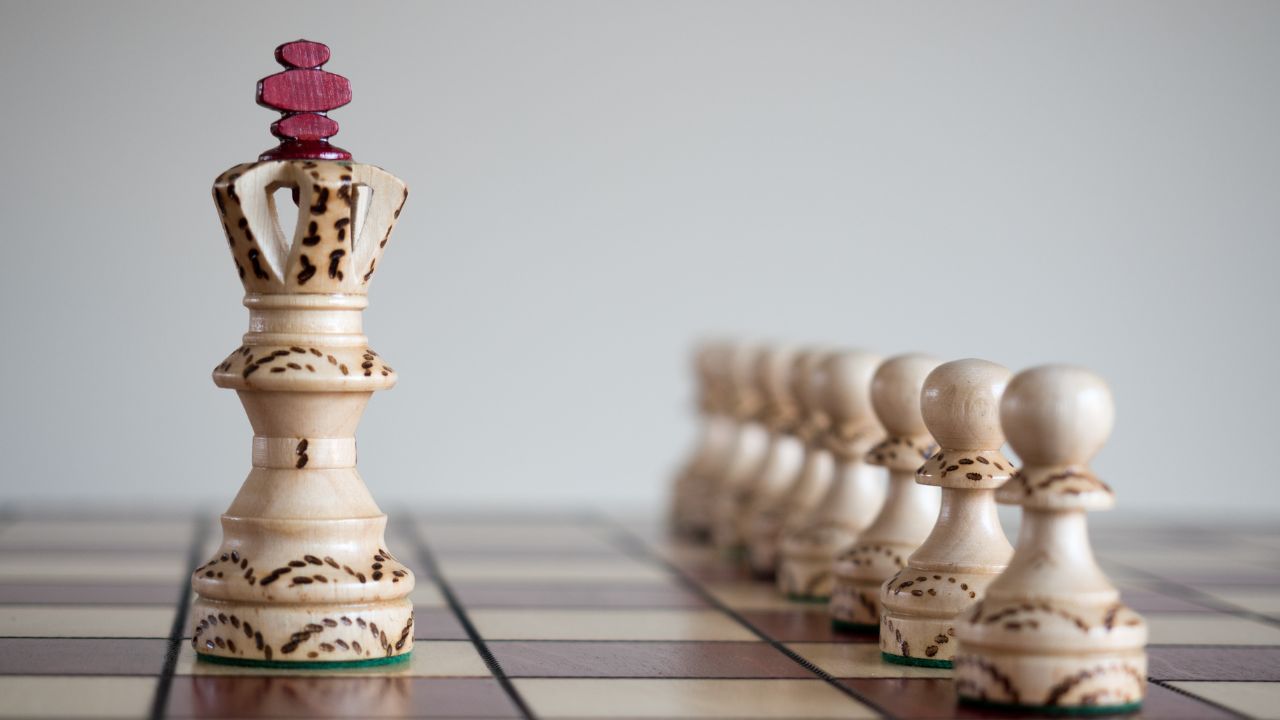- Introduction
- Life Lessons from Chess
- Lesson 1: Plan ahead and be patient
- Lesson 2: Think critically and creatively
- Lesson 3: Learn from your mistakes
- Lesson 4: Practice makes perfect
- Lesson 5: Stay focused and disciplined
- Lesson 6: Adapt to change
- Lesson 7: Think ahead but stay in the present
- Lesson 8: Perseverance is key
- Lesson 9: Learn to take calculated risks
- Lesson 10: Respect your opponent
- Lesson 11: Learn from others
- Lesson 12: Be adaptable
- Lesson 13: Focus on the big picture
- Lesson 14: Stay humble
- Lesson 15: Take care of yourself
- Conclusion
- Ask Danny
- Q — How do the lessons we can learn from the game of chess apply to real-life situations?
- Q — What are some examples of situations in your life where you have applied the lessons you learned from playing chess?
- Q — How can the lesson of staying focused on the big picture help you achieve your long-term goals?
- Q — How can the lesson of taking calculated risks help you make better decisions in your personal and professional life?
- Q — What are some ways that you can apply the lesson of perseverance to overcome challenges and setbacks in your life?
- Q — What is the importance of staying humble in both victory and defeat, and how can this help you grow as an individual?
- Q — How can the lesson of adapting to change help you navigate unexpected events in your life?
- Q — How can you balance planning ahead and being patient with staying focused on the present moment?
- Q — How can you learn from your mistakes and use them as opportunities to grow and improve?
- Q — How can you apply the lesson of respecting your opponents to your personal and professional relationships?
- Keywords:
Introduction
Chess is a game that has been played for centuries, with roots tracing back to the sixth century. It is a game of strategy, skill, and patience, and those who play it well are often admired for their intelligence and foresight. However, the game of chess is not only an enjoyable pastime but also a source of valuable life lessons. In this article, we will discuss the lessons we can learn from the game of chess that could prove to be useful for our lives, no matter what we do.
Life Lessons from Chess
Lesson 1: Plan ahead and be patient
One of the most crucial aspects of playing chess is planning ahead. Players must consider several moves in advance, anticipate their opponent’s moves, and adjust their strategy accordingly. This requires patience, careful thought, and a willingness to think beyond the immediate moment. Similarly, in life, we must plan ahead for our future, set goals, and take steps to achieve them. This may require sacrifice and patience, but it will ultimately pay off in the long run.
Lesson 2: Think critically and creatively
In chess, players must be both critical and creative in their thinking. They must evaluate the strengths and weaknesses of their position, consider various options, and make decisions based on their analysis. Similarly, in life, we must learn to think critically and creatively. We must evaluate our options, consider the potential outcomes of our decisions, and use our creativity to find new solutions to problems.
Lesson 3: Learn from your mistakes
Chess players are not immune to mistakes. Even the best players make mistakes from time to time. However, what sets the great players apart from the rest is their ability to learn from their mistakes. They analyze what went wrong, figure out how to avoid making the same mistake again, and adjust their strategy accordingly. Similarly, in life, we must learn from our mistakes. We should not be afraid to fail or make mistakes; instead, we should use them as opportunities to learn and grow.
Lesson 4: Practice makes perfect
Chess players know that practice is essential to becoming a better player. They spend hours studying strategies, analyzing games, and practicing their moves. They understand that improvement comes gradually and requires consistent effort. Similarly, in life, we must practice our skills to improve. Whether it’s a sport, a musical instrument, or a job-related skill, we must practice regularly to become better at it.
Lesson 5: Stay focused and disciplined
In chess, it is essential to stay focused and disciplined throughout the game. Players must maintain their concentration, resist distractions, and stick to their strategy. Similarly, in life, we must stay focused and disciplined to achieve our goals. We must resist distractions and stay committed to our path, even when faced with obstacles or setbacks.
Lesson 6: Adapt to change
In chess, players must adapt to changes in the game. They must adjust their strategy when their opponent makes unexpected moves or when the board changes. Similarly, in life, we must learn to adapt to changes. Life is unpredictable, and we must be prepared to adjust our plans and strategies when unexpected events occur.
Lesson 7: Think ahead but stay in the present
In chess, players must plan ahead, but they must also stay focused on the present moment. They must think about their long-term strategy, but they must also consider the immediate moves they need to make. Similarly, in life, we must balance our long-term goals with our immediate needs. We must think about our future, but we must also focus on the present moment and take steps to achieve our goals.
Lesson 8: Perseverance is key
Chess players know that perseverance is essential to winning a game. They may face setbacks, but they must keep playing and remain focused on their strategy. Similarly, in life, we must persevere through challenges and setbacks. We must stay determined and focused on our goals, even when it seems like the odds are against us.
Lesson 9: Learn to take calculated risks
In chess, players must sometimes take calculated risks to gain an advantage. They must weigh the potential risks and benefits of a move before making it. Similarly, in life, we must learn to take calculated risks. We must evaluate the potential outcomes of our decisions and take risks when the potential benefits outweigh the risks.
Lesson 10: Respect your opponent
In chess, players must respect their opponent. They must acknowledge their opponent’s strengths and weaknesses and play accordingly. Similarly, in life, we must respect our opponents, whether they are competitors or adversaries. We must acknowledge their strengths and weaknesses and treat them with respect and dignity.
Lesson 11: Learn from others
Chess players often study the games of other players to learn new strategies and techniques. They also seek advice from more experienced players to improve their skills. Similarly, in life, we can learn from others. We can seek advice from mentors and learn from the experiences of others to improve our skills and knowledge.
Lesson 12: Be adaptable
Chess players must be adaptable and able to adjust their strategy based on their opponent’s moves. Similarly, in life, we must be adaptable and able to adjust our plans and strategies based on changing circumstances.
Lesson 13: Focus on the big picture
In chess, players must focus on the big picture, not just individual moves. They must consider their overall strategy and long-term goals. Similarly, in life, we must focus on the big picture and consider our long-term goals and aspirations.
Lesson 14: Stay humble
Chess players know that even the best players can be beaten, and they must remain humble in victory and defeat. Similarly, in life, we must remain humble and avoid arrogance or complacency, even when we achieve success.
Lesson 15: Take care of yourself
In chess, players must take care of themselves physically and mentally to perform at their best. Similarly, in life, we must prioritize our physical and mental health to achieve our goals and enjoy our success.
Conclusion
In conclusion, the game of chess offers numerous valuable life lessons that can help us in our personal and professional lives. From planning ahead and being patient to staying focused and disciplined, these lessons can help us achieve our goals, overcome challenges, and grow as individuals. By applying these lessons to our lives, we can become better problem-solvers, decision-makers, and leaders. Whether we are playing chess or navigating the complexities of life, these lessons can prove to be invaluable.
Ask Danny
Q — How do the lessons we can learn from the game of chess apply to real-life situations?
The lessons we can learn from the game of chess are valuable for real-life situations because they teach us important skills and strategies that can be applied to various areas of our lives. For example:
- Planning ahead and being patient: This lesson can be applied to many areas of life, such as career planning, financial planning, and personal development. By setting long-term goals and being patient in working towards them, we can achieve success and avoid making impulsive decisions.
- Thinking critically and creatively: This lesson can help us develop problem-solving skills, which are essential for success in any field. By thinking critically, we can analyze situations, identify potential solutions, and make informed decisions. By thinking creatively, we can find innovative solutions to problems and think outside the box.
- Learning from your mistakes: This lesson teaches us the importance of taking responsibility for our mistakes and using them as opportunities to learn and grow. By reflecting on our mistakes, we can identify areas for improvement and make better decisions in the future.
- Practice makes perfect: This lesson emphasizes the importance of consistent effort and hard work in achieving success. By practicing our skills and continuing to learn and improve, we can become experts in our field and achieve our goals.
- Staying focused and disciplined: This lesson teaches us the importance of staying committed to our goals and avoiding distractions. By staying focused and disciplined, we can achieve our goals and overcome obstacles.
- Adapting to change: This lesson is crucial in today’s rapidly changing world. By being adaptable, we can respond to new challenges and opportunities and stay competitive in our field.
- Thinking ahead but staying in the present: This lesson teaches us to balance our long-term goals with our immediate needs. By focusing on the present moment and taking steps to achieve our goals, we can make steady progress towards our long-term aspirations.
Overall, the lessons we can learn from the game of chess are applicable to various real-life situations and can help us achieve success and fulfillment in our personal and professional lives.
Q — What are some examples of situations in your life where you have applied the lessons you learned from playing chess?
- A businessperson planning their strategy: Just as a chess player plans their moves, a businessperson can plan their strategy by considering their long-term goals, anticipating their competitors’ moves, and adjusting their strategy accordingly.
- A student studying for exams: Just as a chess player practices their moves, a student can study consistently to improve their knowledge and skills. They can also think critically and creatively when solving problems on their exams.
- A professional athlete preparing for a competition: Just as a chess player stays focused and disciplined during a game, a professional athlete can stay focused and disciplined during their training and competition. They can also adapt to unexpected events during the competition and think ahead to make strategic decisions.
- A musician practicing their instrument: Just as a chess player practices their moves, a musician can practice their instrument regularly to improve their skills. They can also think creatively when composing music or improvising.
- A parent raising their child: Just as a chess player plans their moves, a parent can plan their child’s upbringing by considering their long-term goals for their child and adjusting their parenting style accordingly. They can also learn from their mistakes and adapt to unexpected events.
Overall, the lessons learned from playing chess can be applied to various situations in life, from personal development to professional success. By applying these lessons, individuals can improve their skills, make better decisions, and achieve their goals.
Q — How can the lesson of staying focused on the big picture help you achieve your long-term goals?
The lesson of staying focused on the big picture can be incredibly helpful in achieving long-term goals. When we focus on the big picture, we are able to keep our long-term goals in mind and avoid getting bogged down by short-term setbacks and distractions. Here are some ways in which this lesson can be applied:
- Keeping the end goal in mind: When working towards a long-term goal, it’s important to remember the end goal and keep it in mind. By visualizing what we want to achieve, we can stay motivated and focused, even during challenging times.
- Setting milestones: To achieve a long-term goal, it’s helpful to break it down into smaller, more manageable milestones. By focusing on each milestone, we can stay motivated and track our progress towards our ultimate goal.
- Prioritizing tasks: When working towards a long-term goal, it’s important to prioritize tasks based on their importance and relevance to the ultimate goal. By focusing on tasks that are most important and relevant, we can make steady progress towards our goal.
- Avoiding distractions: To stay focused on the big picture, it’s important to avoid distractions that can derail us from our ultimate goal. By staying focused on what’s important and avoiding unnecessary distractions, we can make progress towards our long-term goal.
- Staying flexible: While it’s important to stay focused on the big picture, it’s also important to stay flexible and adapt to changing circumstances. By remaining flexible, we can adjust our approach as needed and stay on track towards our long-term goal.
Overall, staying focused on the big picture can help us achieve our long-term goals by keeping us motivated, focused, and on track. By breaking down our goals into manageable milestones, prioritizing tasks, avoiding distractions, and staying flexible, we can make steady progress towards our ultimate goal.
Q — How can the lesson of taking calculated risks help you make better decisions in your personal and professional life?
The lesson of taking calculated risks can be incredibly helpful in making better decisions in both our personal and professional lives. Here are some ways in which this lesson can be applied:
- Weighing the potential risks and benefits: When faced with a decision, it’s important to evaluate the potential risks and benefits of each option. By weighing these factors, we can make an informed decision and take a calculated risk that is more likely to result in a positive outcome.
- Considering past experiences: By considering past experiences and learning from our mistakes, we can make better decisions about which risks to take and which to avoid.
- Trusting our instincts: Sometimes, taking a calculated risk requires us to trust our instincts and intuition. By being in tune with our intuition, we can make better decisions and take risks that align with our values and goals.
- Staying open to new possibilities: Taking calculated risks often involves stepping outside our comfort zone and being open to new possibilities. By embracing new experiences and opportunities, we can expand our horizons and take risks that can lead to personal and professional growth.
- Being prepared for the consequences: Taking a calculated risk means being prepared for the potential consequences of our decision. By anticipating the possible outcomes and having a plan in place, we can minimize the negative consequences of our decision.
Overall, taking calculated risks can help us make better decisions in both our personal and professional lives. By weighing the potential risks and benefits, considering past experiences, trusting our instincts, staying open to new possibilities, and being prepared for the consequences, we can make informed decisions that are more likely to result in positive outcomes.
Q — What are some ways that you can apply the lesson of perseverance to overcome challenges and setbacks in your life?
The lesson of perseverance is incredibly important for overcoming challenges and setbacks in life. Here are some ways in which this lesson can be applied:
- Maintaining a positive mindset: When faced with challenges and setbacks, it’s important to maintain a positive mindset and believe in ourselves. By focusing on our strengths and capabilities, we can overcome obstacles and stay motivated to achieve our goals.
- Breaking down tasks into smaller goals: When facing a large challenge, it can be helpful to break it down into smaller, more manageable goals. By focusing on each smaller goal, we can make progress towards overcoming the larger challenge.
- Seeking support from others: Perseverance is not a solitary effort. Seeking support from friends, family, or a mentor can provide us with encouragement, motivation, and guidance during challenging times.
- Learning from setbacks: Rather than getting discouraged by setbacks, it’s important to learn from them and use them as opportunities for growth and improvement. By analyzing what went wrong and adjusting our approach, we can make progress towards overcoming the challenge.
- Celebrating small victories: Celebrating small victories along the way can help us stay motivated and keep our focus on the end goal. By recognizing and celebrating each small success, we can build momentum towards achieving our ultimate goal.
- Being persistent: Perseverance requires persistence and determination. By staying committed to our goal and persisting in the face of challenges and setbacks, we can overcome obstacles and achieve our goals.
Overall, applying the lesson of perseverance can help us overcome challenges and setbacks in our personal and professional lives. By maintaining a positive mindset, breaking down tasks into smaller goals, seeking support from others, learning from setbacks, celebrating small victories, and being persistent, we can overcome even the most difficult challenges and achieve our goals.
Q — What is the importance of staying humble in both victory and defeat, and how can this help you grow as an individual?
Staying humble in both victory and defeat is incredibly important because it can help us grow as individuals and build stronger relationships with others. Here are some reasons why humility is important:
- Maintaining perspective: When we remain humble, we are able to maintain perspective on our successes and failures. This can help us avoid becoming too complacent in victory or too discouraged in defeat, and instead keep our focus on the bigger picture.
- Building relationships: Humility can help us build stronger relationships with others, whether they are colleagues, friends, or family members. By acknowledging our own limitations and giving credit to others for their contributions, we can build trust and respect with those around us.
- Learning from others: When we remain humble, we are open to learning from others, regardless of their background or expertise. This can help us expand our knowledge and skills and become more well-rounded individuals.
- Encouraging growth: Humility can also encourage personal and professional growth. By acknowledging our mistakes and weaknesses, we can identify areas for improvement and take steps to grow and develop as individuals.
- Fostering empathy: When we remain humble, we are more likely to empathize with others and understand their perspectives. This can help us build stronger relationships and work more effectively with others.
Overall, staying humble in both victory and defeat is essential for personal and professional growth. By maintaining perspective, building relationships, learning from others, encouraging growth, and fostering empathy, we can become better individuals and make a positive impact on those around us.
Q — How can the lesson of adapting to change help you navigate unexpected events in your life?
The lesson of adapting to change is incredibly important for navigating unexpected events in our lives. Here are some ways in which this lesson can be applied:
- Staying flexible: Adapting to change requires us to stay flexible and open to new possibilities. By being willing to adjust our plans and expectations, we can more easily navigate unexpected events.
- Being proactive: Rather than waiting for events to unfold, it’s important to be proactive and take action when faced with unexpected situations. By taking control of the situation, we can make more informed decisions and find new opportunities.
- Staying positive: When faced with unexpected events, it can be easy to become overwhelmed or discouraged. Staying positive and focusing on the potential opportunities that come with change can help us maintain a sense of optimism and resilience.
- Seeking support: Adapting to change can be difficult, and it’s important to seek support from friends, family, or a professional if needed. By seeking support, we can gain perspective and find new solutions to the challenges we face.
- Learning from experience: By adapting to change, we can gain new experiences and skills that can be applied in future situations. By reflecting on our experiences, we can learn from our mistakes and better navigate unexpected events in the future.
Overall, the lesson of adapting to change can help us navigate unexpected events in our lives by helping us stay flexible, proactive, positive, and open to learning. By embracing change and adapting to new situations, we can find new opportunities for growth and achieve success in the face of adversity.
Q — How can you balance planning ahead and being patient with staying focused on the present moment?
Balancing planning ahead and being patient with staying focused on the present moment can be challenging, but it’s essential for achieving long-term success while maintaining a sense of peace and happiness in the present. Here are some strategies for finding this balance:
- Set long-term goals: Setting long-term goals can help us stay focused on the bigger picture and plan ahead for the future. By setting specific, measurable goals, we can create a roadmap for achieving our long-term aspirations.
- Break down goals into smaller steps: While setting long-term goals is important, it’s equally important to break these goals down into smaller, more manageable steps. This can help us stay focused on the present moment and take action towards our long-term goals without feeling overwhelmed.
- Prioritize tasks: When planning ahead, it’s important to prioritize tasks based on their importance and relevance to our long-term goals. By focusing on tasks that are most important and relevant, we can make steady progress towards our goals while staying present in the moment.
- Practice patience: Patience is essential for balancing planning ahead with staying focused on the present moment. By recognizing that success takes time and being patient with our progress, we can avoid becoming too focused on the future and enjoy the present moment.
- Practice mindfulness: Mindfulness can help us stay present in the moment and avoid getting caught up in worries about the future. By practicing mindfulness through techniques like meditation, we can learn to appreciate the present moment while still working towards our long-term goals.
- Stay adaptable: While it’s important to plan ahead, it’s also important to stay adaptable and adjust our plans as needed. By remaining flexible and open to new possibilities, we can navigate unexpected events and stay focused on the present moment while still working towards our long-term goals.
Overall, balancing planning ahead and being patient with staying focused on the present moment requires a combination of goal-setting, prioritization, patience, mindfulness, and adaptability. By finding this balance, we can achieve long-term success while enjoying the journey and finding happiness in the present moment.
Q — How can you learn from your mistakes and use them as opportunities to grow and improve?
Learning from mistakes is a key part of personal growth and development. Here are some ways to learn from mistakes and use them as opportunities to grow and improve:
- Take responsibility: To learn from a mistake, it’s important to take responsibility for it. Acknowledge your role in the situation and avoid blaming others or making excuses.
- Analyze the mistake: Once you’ve taken responsibility, take the time to analyze what went wrong. Identify the factors that contributed to the mistake and reflect on what you could have done differently.
- Learn from the mistake: Use the insights gained from analyzing the mistake to develop strategies to prevent similar mistakes from happening in the future. Make a plan of action to avoid repeating the same mistake again.
- Don’t dwell on the mistake: While it’s important to learn from mistakes, it’s also important to avoid dwelling on them. Accept that mistakes happen and focus on moving forward and taking positive steps towards growth and improvement.
- Seek feedback: Seeking feedback from others can provide valuable insights into what went wrong and how to improve. Ask for feedback from colleagues, friends, or mentors to gain different perspectives and insights.
- Take action: Finally, take action to apply what you’ve learned from your mistake. Use the experience as an opportunity to grow and improve, and take proactive steps to make positive changes.
Overall, learning from mistakes requires self-reflection, self-awareness, and a willingness to take responsibility and learn from the experience. By analyzing mistakes, learning from them, seeking feedback, and taking proactive steps towards improvement, we can turn mistakes into opportunities for growth and development.
Q — How can you apply the lesson of respecting your opponents to your personal and professional relationships?
Respecting your opponents is an important lesson that can be applied to personal and professional relationships. Here are some ways in which this lesson can be applied:
- Acknowledge differences: In personal and professional relationships, it’s important to acknowledge and respect the differences between individuals. Recognize that everyone has different experiences, values, and perspectives, and be open to learning from them.
- Listen actively: Actively listening to others is an important aspect of respecting opponents. By listening carefully and attentively, we can understand their viewpoints and show that we value their opinions.
- Avoid making assumptions: To respect opponents, it’s important to avoid making assumptions about their intentions or motivations. Instead, ask questions to gain clarity and understanding.
- Be gracious in victory and defeat: Whether we win or lose, it’s important to be gracious and respectful towards our opponents. Congratulate them on their successes, and show empathy and understanding in the face of defeat.
- Find common ground: In personal and professional relationships, it’s important to find common ground and work towards shared goals. By focusing on commonalities and shared objectives, we can build stronger relationships and achieve success together.
- Stay focused on the issues: When disagreements arise, it’s important to stay focused on the issues at hand and avoid personal attacks. By discussing issues in a respectful and constructive manner, we can find solutions that work for everyone.
Overall, respecting opponents is an important lesson that can be applied to personal and professional relationships. By acknowledging differences, listening actively, avoiding assumptions, being gracious in victory and defeat, finding common ground, and staying focused on the issues, we can build stronger relationships and achieve success together.
Keywords:
- Perseverance: The quality of continuing to pursue a goal or objective despite setbacks, obstacles, or difficulties.
- Humility: The quality of being modest or humble in attitude or behavior.
- Adaptability: The ability to adjust to new or changing situations.
- Risk-taking: The act of taking calculated risks in order to achieve a desired outcome or goal.
- Planning: The process of creating a roadmap or strategy for achieving a specific goal or objective.
- Focus: The ability to concentrate one’s attention and efforts on a particular task or goal.
- Mindfulness: The practice of being present in the moment and fully engaged in the task at hand.
- Resilience: The ability to recover quickly from setbacks, challenges, or adversity.
- Patience: The ability to remain calm and composed in the face of delay, frustration, or adversity.
- Problem-solving: The process of finding solutions to complex or difficult problems.
- Decision-making: The process of making choices or selecting courses of action based on careful consideration of available options and potential outcomes.
- Self-improvement: The process of improving oneself, whether through personal growth, skill development, or other means.
- Goal-setting: The process of setting specific, measurable goals in order to achieve a desired outcome.
- Empathy: The ability to understand and share the feelings of another person.
- Listening: The act of paying close attention to what someone else is saying in order to understand and respond appropriately.
- Reflection: The act of thinking deeply about one’s own experiences, thoughts, or feelings in order to gain insight or understanding.
- Adaptability: The ability to adjust to new or changing situations.
- Growth mindset: The belief that one’s abilities and intelligence can be developed through dedication, hard work, and perseverance.
- Relationships: The connections between individuals or groups, including personal, professional, and social connections.
- Trust: The belief in the reliability, truth, or ability of someone or something.







0 Comments